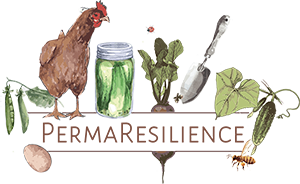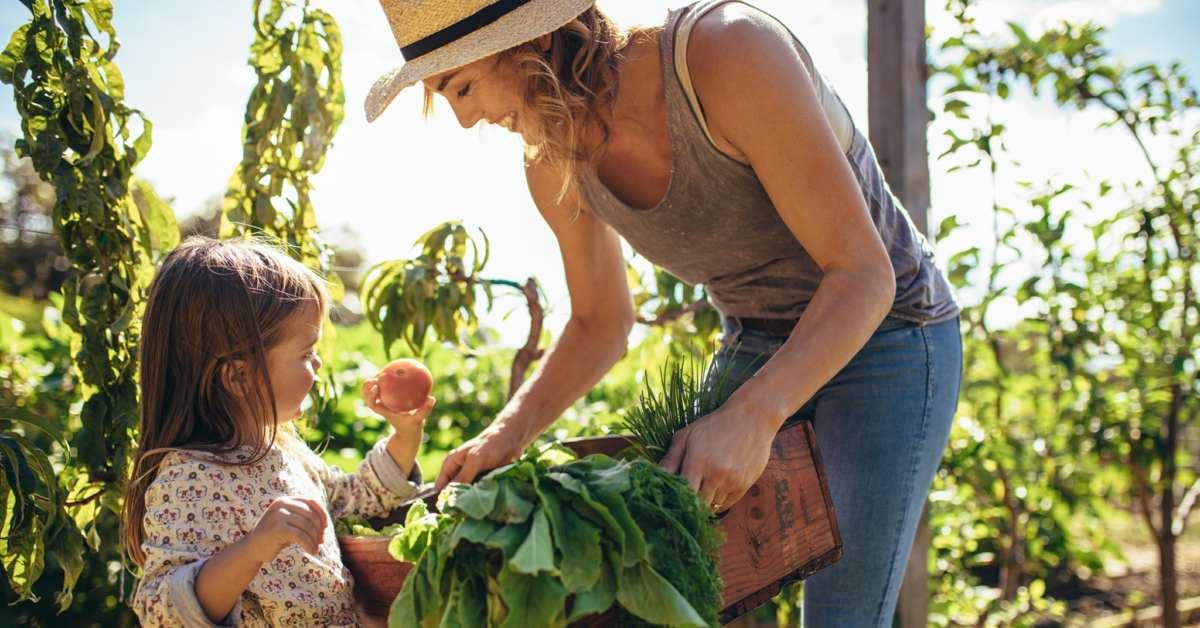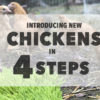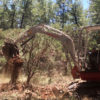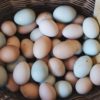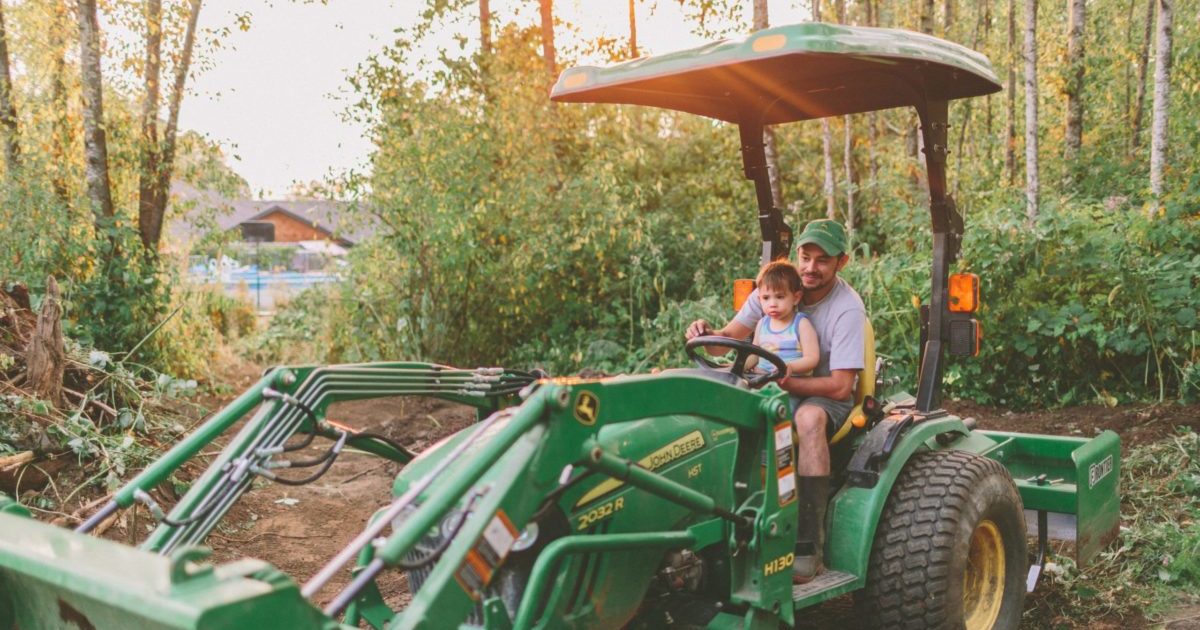Is permaculture gardening any better than organic gardening? I’m comparing the two methods in this video and sharing the 5 strategies that you can begin to implement in your garden TODAY to create the healthiest veggies possible!
Video Transcript:
Are you a person who grows food conventionally or even organically?
Well, if so, I pre-apologize here. I’m gonna burst your bubble, but I’ve got something I want to tell you. Let’s go for a walk.
So, while growing food conventionally or organically is better than not growing any food at all, the reality is that both methods are time-consuming and harder than they need to be. And the ultimate truth is that both methods are not sustainable and they’re not self-sufficient.
Additionally, both methods don’t necessarily produce the most nutrient-dense food. But I don’t want you to be without hope here, okay? There’s an alternative that anyone can use in any climate, in any amount of space, and it takes less time, energy, and money.
Then let’s dive in because I got a lot on my mind. And let’s duck into my mini-high tunnel where it’s a little bit less windy and a little bit warmer.
I’m going to share with you the differences between conventional gardening, organic gardening, and permaculture gardening. And I’m going to share with you why permaculture gardening is superior to all of these methods and it’s the only way to go, okay?
And I’m going to give you five strategies that you can start applying in your garden right away to transition it to more of a permaculture-style garden. And at the very end, I’m going to throw in a six.
A six permaculture gardening strategy that I think is probably hands down the most important one that there is, so stay tuned for that. Alright, so first let’s talk about conventional gardening. Conventional gardening or farming is the modern industrial way of doing things. In a conventional garden, the primary tools that are used to achieve success are petroleum-based chemical fertilizers. For example, fertilizers for plants, pesticides, herbicides, fungicides, and so on.
Now, conventional gardening is flat-out, not sustainable. It’s toxic to the environment, it’s toxic to humans, and it produces subpar, nutrient-void foods. Okay, additionally, conventional gardening is just not self-sufficient.
If your garden relies on store-bought fertilizers and pesticides to produce foods and there are any breaks in the supply chain, or if something can’t be produced, made, and then bought, well, then your ability to grow food is lost.
Right now, I’m guessing that a lot of people here are not probably growing their food conventionally. You’re likely more approach it more from the organic perspective, which is a step in the right direction. The basic idea of organic gardening was to focus on feeding the soil, which then in turn feeds the plants. And I completely agree with that.
But there are a couple of big problems with organic gardening. There seems to be this um acceptance for the use of, you know, organic fertilizers and pesticides and herbicides, and this is kind of where I start to disagree because from what I can tell, all of these organic-approved fertilizers and pesticides and whatnot, they’re actually still toxic, both for the environment and humans.
So for example, if you look at organic gardening websites and organic gardening supply companies, neem oil is a common universal treatment for a variety of things. Neem oil is an all-in-one herbicide, pesticide, and fungicide, and when I looked at the ingredients label on a bottle of neem oil, it was one percent neem oil and 99 other ingredients, and they didn’t list the other ingredients. And then if you read further on the label, it talks about how the product is toxic to aquatic life.
So you’re spraying it in your garden, and then it’s eventually making its way into the groundwater and into the watershed. And on the label, if you read it carefully, the labels basically say it’s toxic to humans, don’t put it on, don’t get it on your hands, don’t get it in your eyes. If you ingest it, you know, call poison control.
And so, what I see is that you know, in the organic gardening movement, they’re almost shooting themselves in the foot, because they’ll take something like neem oil, and they’ll spray it in their garden to take care of whatever disease or pest. But the problem is, is that neem oil doesn’t just take care of that one pest or disease.
Like, let’s say you’re trying to get rid of powdery mildew, the neem oil kills off everything. It kills off all the beneficial insects and bugs. It destroys the life in the soil that you’re trying to build, and it just causes damage to your immediate garden ecosystem.
So, in my opinion, when you’re using these OMRI-certified organic treatments in the garden, you’re just making more work for yourself, because you’re not building a self-contained ecosystem that’s balanced. You’re essential, in my opinion, doing conventional gardening with something else that’s been labeled as better, even though it’s destructive to the local environment, destructive to your garden, and making more work for you by having to continually build the soils, continually battle pests, and so on.
And an important piece here is that, in order to have healthy pest and disease-resistant plants in our gardens, the cornerstone for that is healthy soil. So, these organic-approved pesticides and herbicides, perpetuate the cycle of pests and disease in a garden. Not cool, right?
So for a person who wants to be sustainable, organic gardening is not exactly sustainable. And for a person who wants to be self-sufficient, organic gardening, as well, still relying on the supply systems to provide what the garden needs to grow, is not self-sufficient.
And all of these reasons here are why I’m in love with permaculture gardening. It’s the only way to grow food that actually is sustainable, that actually can be self-sufficient, and takes less time and energy. So let’s dive into that, all right?
So, in a permaculture garden, what we do is model the garden and the way we do things in the garden after nature. And when we do so, we have gardens that take less work time and energy, and they produce plants that are more pest-resistant, more disease resistant, and tend to be more nutrient-dense.
Now, in the 10 years, we’ve been growing food, we’ve done all of these methods, but in probably the last seven or eight years, we haven’t done conventional or organic gardening in that kind of way. We’ve only been doing permaculture gardening.
In the last seven years, we’ve had abundant gardens with little work. We’ve never lost entire gardens or entire crops to pests and diseases. We’ve never had to buy pesticides, fungicides, herbicides, or anything like that. We don’t till. We don’t weed our garden, and they typically produce massive amounts of food.
You know, another way to put it is our garden is a compliment to our life, and we aren’t necessarily beholden to it. Does that sound like something you’d like to have? Let’s get into five strategies that you can start implementing today in your gardens to transition them from conventional and organic gardens to permaculture gardens, so that way you can do more in less time.
Hey, I hope you’re getting value out of this video, and if so, consider smashing that like button. It’s a free way to support the channel and keep this content coming your way. Additionally, consider subscribing if this is the kind of thing that you want to see in your feed every week.
First, we focus on building soils, just like organic gardening, but there are a couple of minor distinctions here that are critical to know. First, because we’re not using herbicides, pesticides, and fungicides in our garden, like neem oil, for example, we’re not destroying the soil that we’ve worked so hard to build.
Because when we build healthy soils, we have pest-resistant plants, and disease-resistant plants that are more nutrient-dense and require less time in the garden. And we do this by making large quantities of homemade compost from a variety of different things to make sure that we get a good mix of bacteria and nutrients in our soils here.
So, for example, we’ll be composting all the kitchen scraps that come out of our kitchen. We’ll be composting all the greens and browns that come out of the landscape around us in the garden around us. We’ll be bringing in manures from local farmers to build our own compost piles, and we have a composting chicken system that builds compost for us too.
So, we have all these different types of composting systems to build large amounts of compost, and I’m talking yards and yards and yards of compost every season. And just getting that into our garden beds. Additionally, we focus on feeding the soil life. So, we brew hundreds and hundreds of gallons of compost tea throughout the season to introduce beneficial bacteria and feed the soil into our garden.
All right, second, we don’t till our garden beds because the reality is that if you have to till your garden beds every season, you’re doing something wrong. It shouldn’t be like that.
Now, the exception here is, I’m okay with tilling when it comes to establishing a new garden bed because, you know, the ground is probably a total hard pan. You know if you have a house in a backyard, the backyard is completely compacted after construction, right?
There’s just no topsoil there. It’s all subsoil, and so in that instance, I’m okay with tilling. But after that first till where you’re constructing the garden beds, I don’t ever till after that. Instead of tilling, we use methods like layer mulching, and deep mulching also called chop and drop.
We solarize our soils, we plant cover crops and plants that will till the soils for us, and if needed, we will manually loosen the soil a little bit with something just like a shovel or broad fork.
But by and large, when you take care of soils, especially by keeping soil covered with a layer of mulch, you’re going to find that it isn’t necessary to dig into the garden beds to be able to plant the next season.
Third, in our garden, we promote biodiversity. What we’re looking for is a balance of all creatures, you know, insects good and bad, for example. And by doing so, what happens is that when we…
Well, I’ve mentioned that we typically don’t have major pest or disease problems in our gardens because of the way we’re managing our soils.
It’s not to say we don’t occasionally have some plants that are subject to, you know, a little bit of pests and disease, but by and large, it doesn’t spread throughout the whole crop. But what happens is that pest or that disease doesn’t tend to spread very far because our garden is attracting beneficial creatures like ladybugs, for example.
So we kind of have a form of, like, you know, integrated pest management or natural pest control within the garden itself, right?
Fourth, we actually plan for some crop loss. And so what we do when we’re, uh, starting our seeds in the spring or, you know, planting beds at is we tend to include maybe 20 percent more, 30 percent more, uh, than we actually think we’ll need.
Oftentimes, this is just excess that can go to the chickens or, you know, neighbors and friends, but sometimes, you know, we do have a crop that suffers a little bit of loss. And by planting that extra amount of crops, the way we kind of look at it is we’re also giving and not just taking from the environment.
All right, fifth, we design more of a wild garden than anything else. So instead of like neat and tidy rows in a, you know, conventional monoculture farm or conventional garden kind of setup, we tend to enter mixed plants, to layer plants, to make more of forest gardens than just flat horizontal planes of food. And two things happen when we do this.
Essentially, by mixing up the plants, we’re making it harder for a problem to migrate from one plant to another. So for example, if there are aphids all over a weaker kale plant, if it’s right next to another kale plant, it tends to be, from my observation, must see much easier for that pest to then roll over onto the next plant and just kind of keep going, even if it might not have been as weak of a plant.
So by dispersing the plants and kind of separating them out, we make it harder for a pest to jump from plant to plant.
Additionally, different plants serve different functions and purposes. Some plants are natural insect repellents. If you start intermixing plants, you can actually get plants to do some of the work for you. Some plants are dynamic nutrient accumulators, such as legumes.
They accumulate nitrogen out of the atmosphere and put it into the soil. So, if we start mixing legumes in corn, which is a heavy nitrogen feeder, now all of a sudden we don’t have to fertilize that corn as much, if at all because the legume is doing the job for us. And on top of that, we’ve now kind of separated out and mixed the plants, making more of a forest garden where pests can’t just run nearly as rampant.
It’s getting a little warm in the hoop house for me here, and the wind’s died down a little bit, so I want to take you for a quick walk while I cool down and talk about the sixth most important strategy of them all.
The most important piece here is that after all my years of growing our own food, I guess I’ve realized that there’s almost a selfish nature to it. And to explain my selfish nature, let me tell you a little bit about one specific thing in my very first garden. What I did is I planted a row of green beans or snap peas and some trellising legumes, and I built a trellis behind them.
And I put all this work and energy into this garden bed. Pretty quickly into the season, the plants started to get powdery mildew all over. And what I ended up deciding to do is, “Oh crap, I put all this time and energy into trying to get this crop to grow. I should mitigate this problem, this powdery mildew before I lose this entire crop.”
Well, you know, I went and bought some of the things that people had recommended and sprayed it on there, and in the end, I don’t think it actually, if I recall, did anything. Didn’t really change the situation, and I think that it was a total loss anyways. But when, in hindsight, in retrospect, looking back on that, it felt like a really selfish act.
It’s like, “Hey, I’m gonna go get some toxic fungicide and I’m going to spray it on these plants in hopes that I can get a harvest without having regard for a) the local environment and the toxins that I was putting in that environment, and b) even regard for myself because I was essentially putting toxins into my own garden.”
So I hope that makes sense why I’m saying that there’s almost a selfish nature to treating some of these, you know, problems in a garden sometimes. And after that, I decided to take a little bit different approach to pests and diseases in my garden. Now, obviously, with a whole permaculture gardening thing, that’s helped out a ton, but I’ve decided that I’ll remove, I’ll cull any weak crops over spraying anything like an herbicide or a pesticide to try to help rectify the problem.
And in general, this has worked out great for us because a) we don’t have many pests and disease problems in our permaculture gardens, but also because our gardens are so productive, it doesn’t matter if we lose one crop. There is so much food growing around, well, not right now obviously because it’s, you know, February, but, you know, during the season, there’s so much food growing that it doesn’t really matter.
So I hope that makes sense that sometimes it’s most important to look at the bigger picture, the context of what we’re doing, and the broader impacts of what it has, versus the immediate gratitude, the immediate yield, the immediate harvest that we’re trying to get out of the garden.
